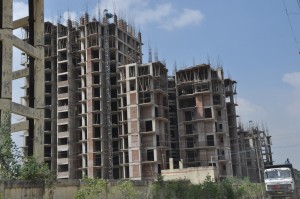News
Regulatory Bill spread Cheers




The realty firmament in the country is set to undergo an altogether different, and undisputedly more pleasant, hue with the Union Cabinet giving its seal of approval to the much-awaited Bill for setting up a regulator for the real estate sector.
The Real Estate (Regulation and Development) Bill, cleared by the Cabinet along with certain key amendments at a meeting on April 6,makes way for setting up of a regulator thereby bringing in the much-needed transparency and credibility to the sector. Besides providing a protective cover
to the home buyers by easing their concerns on delay in delivery and change in project layout plans, the Bill will open a fresh window of institutional funding for the developers.
Under the proposed law, one or more Regulatory Authorities will be set up in each state and Union Territory or one Authority for two or more states or Union Territories by the concerned governments for overseeing of real estate transactions.
Though it may still take almost a year for the regulatory mechanism to set in as the Bill is first required to be passed by both the Houses of Parliament before the actual process takes off, the development has instantly energised the entire sector. An overwhelming positive response garnered by Realty & More from developers across the board is a testimony to their optimism about encouraging business prospects in a more transparent and accountable environment.
The Bill was first introduced by the UPA-ll Government in the Rajya Sabha in August 2013, after which it was referred to a Parliamentary Standing Committee which made several recommendations and submitted its report in February 2014. The Union Cabinet chaired by Prime Minister Narendra Modi gave nod to the proposed amendments which were lying pending in the Upper House.
Through the amendments, the Cabinet has extended the applicability of the Bill to commercial real estate as well. Ongoing projects that have not received completion certificates so far have also been brought under the purview of the Bill. These projects need to be registered with the proposed regulator within three months.
One of the major modifications to the Bill, which should be a matter of abundant joy for the prospective home buyers, is to prevent the promoters from changing plans and structural designs of their projects without seeking the consent of two-third of consumers.
The Bill also makes property brokers and agents accountable as now they will also be liable for punishment for non-compliance of the orders of
the Regulatory Authority and Appellate Tribunals which will beset up once the law in place.
With a view to ushering massive chunk of transparency, developers are required to register their projects and disclose all relevant information, including schedule of development works, land status, status of statutory approvals, pro-forma agreements, names and addresses of real estate agents, contractors and architects, with the Regulatory Authorities.
• The Bill was first introduced by the UPA-II Government in the Rajya Sabha in August 2013, after which it was referred to a Parliamentary Standing Committee which made several recommendations and submitted its report in February 2014.
• The Cabinet has extended the applicability of the Bill to commercial real estate as well. Ongoing projects that have not received completion certificates so far have also been brought under the purview of the Bill.
• One of the major modifications to the Bill is to prevent the promoters from changing plans and structural designs of their projects without seeking the consent of two-third of consumers.
Through another important provision in the Bill, the builders now won’t be able to divert funds of their projects as they will have to mandatorily deposit 50 per cent of funds collected from buyers within 15 days in a separate bank account to meet construction costs. The 50 per cent provision has been made after taking into account the cost of land needed to be acquired before announcing a project. However, reduction of the provision, from the earlier 70 per cent, is being with seen with skepticism in some quarters.
According to Anuj Puri, Chairman & Country Head, JLL India, “This provision will effectively allow developers to continue their practice of diverting funds collected for a project towards land acquisition or other projects, and will work in their favour by also allowing them to grow their land and/or project portfolio.” Still, Puri said, the 50 per cent mandate will place enough restriction on developers to divert funds elsewhere and ensure better completion records. In JLL honcho’s view, for the buyers, the concerns regarding funds diversion will be higher now. “The end result is that the Bill will be slightly less protectionist towards buyers,” he said.


The penal provisions under the proposed law include payment of 1 0 per cent of project cost for nonregistration and payment of additional 1 0 per cent of project cost or three-year imprisonment or both if still not complied with. For wrong disclosure of information orfor not complying with the disclosures and requirements, payment of 5 per cent of the project cost will be imposed. The Bill also vests Regulatory Authorities with the power to cancel project registration in case of persistent violations.
For speedy settlement of disputes, one or more adjudicating officers will be appointed to settle these and impose compensation and interest. Appeals against adjudicating officer and Regulatory Authority can be made to the Appellate Tribunals and final appeals can be heard only in the High Courts.
With such elaborate regulatory mechanism in the offing, the buyer-seller trust deficit in the real estate industry is expected to get narrowed to a
large extent in times to come. The prevailing perception about the Indian realty scenario in the eyes of the global investors will also improve by
miles thereby bringing in the much sought-after funds to the industry. Not without reason, various stakeholders in the real estate industry Realty & More contacted were generally excited with the morale-boosting development although they also pointed out some crucial differences they had with certain provisions of the landmark Bill.
“It is likely to enhance the credibility of the sector as developers will be in a position to borrow funds at competitive rates. This will only help rationalise property prices in the months to come,” said Shishir Baijal, CMD, Knight Frank India. Sachin Sandhir, Global MD, Emerging Business, RICS, said, “It is a significant move by the Government to include provisions to protect buyers, including an additional window to
approach consumer courts for their grievances through Fast-track dispute resolution and Real Estate Appellate Tribunal.” However, Sandhir said, “With more transparency in the sector, we expect the pricing of new launches in the short term to go slightly up in anticipation of the notion that developers may have to bear additional cost to register projects with the real estate regulator, once approved by the Parliament.” But he clarified, “It is not necessarily true that cost to developers will go up because the regulator does not require the developers to seek an extra permit but inform/register their projects with all approvals to maintain proper records.”


These, he said, could create “unnecessary misuse” of the Bill by those in power. Anand pointed out that project registration has to be done online and will get deemed approval in 15 days. The regulator will then allot a login-ID for the project until which a builder cannot start selling.
The regulator will subsequently scrutinise all documents pertaining to the project and can cancel the registration if he thinks they are not in order. “This could open another window for delay and dilute the deemed concept,” he said.
Though Rohit Raj Modi, Vice-President, Credai, welcomed the Bill since “it will reduce the number of ‘one-time developers’ operating in the industry”, he too said, “There are a few areas of concern which the Government should look into.” One of these, he said, was that “willful default must be defined in the Bill in order to remove discretion.” But he was happy that the Bill “will bring in transparency and accountability in real
estate and housing transactions, which will infuse long-term trust in the sector.”
• With a view to ushering massive chunk of transparency, developers are required to register their projects and disclose all relevant information with the Regulatory Authorities.
• Builders now won’t be able to divert funds of their projects as they will have to mandatorily deposit 50 per cent of funds collected from buyers within 15 days in a separate bank account to meet construction costs.
• States will have to make rules within a year, rank of adjudicating officer has been elevated, and web-based online system for submitting applications to be introduced within one year of establishment of Regulatory Authorities.
• The penal provisions under the proposed law include payment of 10 per cent of project cost for non-registration and payment of additional 10 per cent of project cost or three-year imprisonment or both if still not complied with.


SACHIN SANDHIR, Global MD, Emerging Business, RICS


rationalise property prices in the months to come.”
SHISHIR BAIJAL, CMD, Knight Frank India


ANUJ PURl, Chairman & Country Head, JLL lndia


GETAMBER ANAND, President, Credai


MANOJ GAUR, President, Credai NCR


ROHIT RAJ MODI, Vice-President, Credai


MAHIPAL SINGH RAGHAV, CMD, MMR Group


KUSHAGR ANSAL, Director, Ansal Housing


ASHOK GUPTA, CMD, Ajnara India Ltd.
Manoj Gaur, MD of Gaursons India Ltd., also welcomed the Cabinet nod to the Bill, saying that it will send out positive signals. “This Bill will help in keeping a check on the developers who are indulging in malpractices which is affecting the image of the sector among the buyers and
investors,” he emphasised. Adding a rider, Gaur who is also the President of Credai NCR, said, “It would have been much appreciated if the Real Estate Regulatory Authority was granted limited controlling authority.”
In MMR Group CMD Mahipal Singh Raghav’s opinion, “The changes made in the new Bill will work wonders for the proper functioning and smooth operation of realty sector.” But, he too said there is scope of improvements in the Bill. “Since, it is a customer-oriented Bill, buying sentiments will definitely improve, ” he said and added immediately, “Delays in delivery can be controlled a lot if the Government starts a single-window clearance which will save lot of time for the developers.”
Kushagr Ansal, Director, Ansal Housing, said, “This is one of the major news for the sector and will help the customers in a big manner. The Government has a plan to provide ‘Housing for All’; which would meet several hurdles if strict scrutiny will not be present. A regulator sitting in the middle will make sure transparency is achieved and consumer grievances are effectively handled.”


can be attained”.
PRASHANT TIWARI, Chairman, Prateek Group


MOHIT GOEL, CEO, Omaxe Ltd.


estate sector is benefitted”.
RUPESH GUPTA,Director, JM Housing


VINEET RELlA, Managing Director, SARE Homes


of their projects”.
ANIL MITHAS, CMD, Unnati Fortune Group


transparent.”
ARVINDER SINGH, MD, Agrante Realty


interest in realty market.”
PRADEEP AGGARWAL, Chairman, Signature Global


OM CHAUDHRY, Chairman, Astrum Homes
Ajnara India Ltd. CMD Ashok Gupta also believes that amendments to the Real Estate Bill are a good move in the interest of consumers. “It will bring more transparency in real estate sector and will make it more legitimate in nature,” he said. The Government, Gupta said, now “must look into faster clearances of mandatory documents so as to help in timely construction and delivery of projects to avoid being penalised as per the new changes”
While welcoming the Bill, Mohit Gael, CEO of Omaxe Ltd., said, “Certain provisions that the sector had asked for amendment remain unattended.” Elaborating further, Gael said, “We would have preferred escrow limit to be fixed on city basis (Metro/Tier-11) or project
basis (luxury/affordable); instead of a blanket 50 per cent. Also, he said, “bringing ongoing projects under its ambit at this moment would further delay delivery of a vast number of projects (at various stages of construction) in the country.”
Another point of difference, Gael cited was that developers should be allowed to change design and structure post approval of 50 per cent of consumers since a lot of difficulty arises when a developer begins construction. Lastly, and most importantly, he said, “The Bill doesn’t fix accountable equally on all stakeholders.”
“This Bill will help in shielding the buyer’s interest and will fill in the loopholes existing in the sector,” according to Prashant Tiwari, Chairman Prateek Group. He too said, “The Government shuold now focus on making the documentation and approval process easier for the developers so that timely delivery can be attained”.
Rupesh Gupta, Director, JM Housing, said, “It was a major requirement to get this sector regulated in a proper manner so that every other industry/sector associated with real estate sector is benefitted and everything is well organised. It’s a good announcement that customers are given the priority and provisions are made to safeguard their interests.’
Anil Mithas, CMD, Unnati Fortune Group, dubbed the Cabinet nod to the real estate regulatory Bill as “yet another positive step towards the Government’s mission of providing ‘Housing for All by 2020’.” Mithas said, the proposed Regulatory Authority “will not only empower the buyers and keep a check on the transactions but support developers in timely delivery of their projects in order to make the sector more organised.”


AMARJIT BAKSHI, MD, Central Park


DHIRENDER GABA, MD, Fairwealth Housing


SANJEEV VARSHNEY, MD, Prop Leverage
Signature Global Chairman Pradeep Aggarwal finds the amendments in the Bill “justifying the current scenario of real estate sector.” He said, “There are shortcomings which need to be addressed wisely. Instituting authorities for regulating the sector and introducing provisions in the interest of buyers will really be helpful in holding the customers interest in realty market.”
Vineet Relia, Managing Director of SARE Homes, also called it a welcome step. “The proposed framework”, he said, “will not only protect consumer interests but also ensure fair practices and accountability on the part of industry players, thereby restoring the general public’s confidence in the real estate sector.” Furthermore, he said, “The Bill will boost transparency and accountability in buying or investing transactions in housing projects and enhance the sector’s credibility, in turn enabling the sector to access capital”.
Expressing similar sentiments, Arvinder Singh, MD, Agrante Realty Ltd., said, “It’s a good announcement that a regulatory authority is to be established. It would bring a tight hold on the realty sector and ensure the business transactions are transparent and working is under proper governance of the Real Estate Regularity Authority, which would help protect the consumer interest and enhance the demand and buying sentiments in near future”.
Terming the move as “positive”, Om Chaudhry, Chairman, Astrum Homes, said, “Enactment of the Bill will go a long way in bringing in ethical and transparent business practices to the industry and in the process make the industry more attractive for domestic as well as foreign investors.”
Although expressing his extreme happiness at the nod to the Bill, Amarjit Bakshi, Founder & MD, Central Park, said, “We are not against any regulation on real estate but it shouldn’t be anti-developers and development. The long registration procedures and amendments like submitting 50 per cent construction cost is way too higher for developers and would indirectly become a roadblock for the success of developers and industry.”
Calling it “a welcome step taken by the NDA-Ied Union Cabinet”, Sanjay Rastogi, Director, Saviour Builders, said the provisions of the Bill will give a big boost to the real estate sector.


ADITYA PARASHAR, CEO, Superise.com


ANUBHAV JAIN, Director, Silverglades


PRASHANT SOLOMON, MD, Chintel India


SAM CHOPRA, Chairman, REJMAX India
Kumar Bharat, Director, BCC Infrastructures Pvt. Ltd., too called the Real Estate Regulation Bill “A positive initiative towards turning business
environment ethical and transparent.” Bharat added the Bill “will provide a uniform regulatory environment to every member of the sector.”
Hailing the long awaited Bill as the “most welcomed step”, Dhirender Gaba, MD of Fairwealth Housing, said, “The real estate market
has been facing a sluggish demand and the announced regulatory Bill will boost the confidence and the positive sentiments amongst the buyers,
Investors and the end-users.” Gaba added, “The provisions which have been incorporated in the Bill will ensure the transparency, accuracy,
commitment and timely delivery of the projects which will surely bring back the faith and
confidence amongst the buyers.’
Sanjeev Varshney, MD, Prop Leverage, said, ” It is a welcome step from the Government side as this Bill also focuses on plugging malpractices prevailing in the sector from the developers and real estate consultants. Varshney said the proposed Real Estate Regulatory Authority “will build a trust between the real estate consultants and the buyers besides keeping a check on the transactions.”
Gaurav Yadav, Founder & CEO of UdayHomz.com, said, “We hail the Government’s move of approving the much-awaited Real Estate Development and Regulation Bill. It would regulate the country’s property market, notorious for black money and delayed possessions.” The Bill, he said, “is aimed to protect the interest of consumers from errant developers and ensure timely execution of projects.” He was also happy with the Government decision to bring commercial segment under the ambit ofthe Bill.
Though finding the Bill “beneficial for end-users as well as property developers”, Aditya Parashar, Founder & CEO of Superise.com, said, “A lot
depends on the proper deployment of the rule by the Government.If the Bill in its final form addresses these issues, then this will help real estate sector grow.”
Anubhav Jain, Director, Silverglades, said, “With the Government at the Centre finally passing the Real Estate (Regulation and Development) Bill, the real estate industry might finally expose the builders with bad intent and prove to be a boon for the buyers.” However, he said, “The need to have a detailed regulation and a strong regulator for a disciplined growth of the real estate sector cannot be overstated.”
In Chintel India MD Prashant Solomon’s opinion, “While the establishment of a real estate regulator is a positive step in increasing transparency and credibility of builders while protecting the consumers, it will only be valuable if the Government authorities are also legally bound to grant approvals within a specified time period.”
Summarising the overall impact of path-breaking provisions introduced by the Government, Sam Chopra, Founder & Chairman, RE/MAX India, said, “With the approval of the Real Estate Development and Regulation Bill, the Government has been successful in addressing some of the major concerns from an end user’s point of view and has also brought in a wave of positive sentiments in the market.” The manifold
features incorporated in the Bill “will be helpful in making real estate transaction a smooth process in all aspects,” he said.
-



 News3 weeks ago
News3 weeks agoKW Delhi 6 Mall Onboards New Brands
-



 News4 weeks ago
News4 weeks agoManasum Senior Living Launches IKIGAI GOA, A Senior Living Community in North Goa, in collaboration with Prescon Homes
-



 News2 weeks ago
News2 weeks agoGodrej Properties Sells Rs 3k cr+ Homes of Godrej Zenith, Gurugram, within 3 days
-



 News4 weeks ago
News4 weeks agoBridging India Divide: Top 5 Tier- 2 Cities to Focus On
-



 News3 weeks ago
News3 weeks agoCommercial Realty Gets Tech Savvy: Fast Construction, Enhanced Convenience
-



 News4 weeks ago
News4 weeks agoMultipoint Connection – A Definite Boon
-





 News3 weeks ago
News3 weeks agoRBI’s Status Quo on Key Policy Rates to Help Maintain the Real Estate Growth Momentum, Say Industry Stalwarts
-



 News1 week ago
News1 week agoOlive Announces Dhruv Kalro as Co-Founder
























